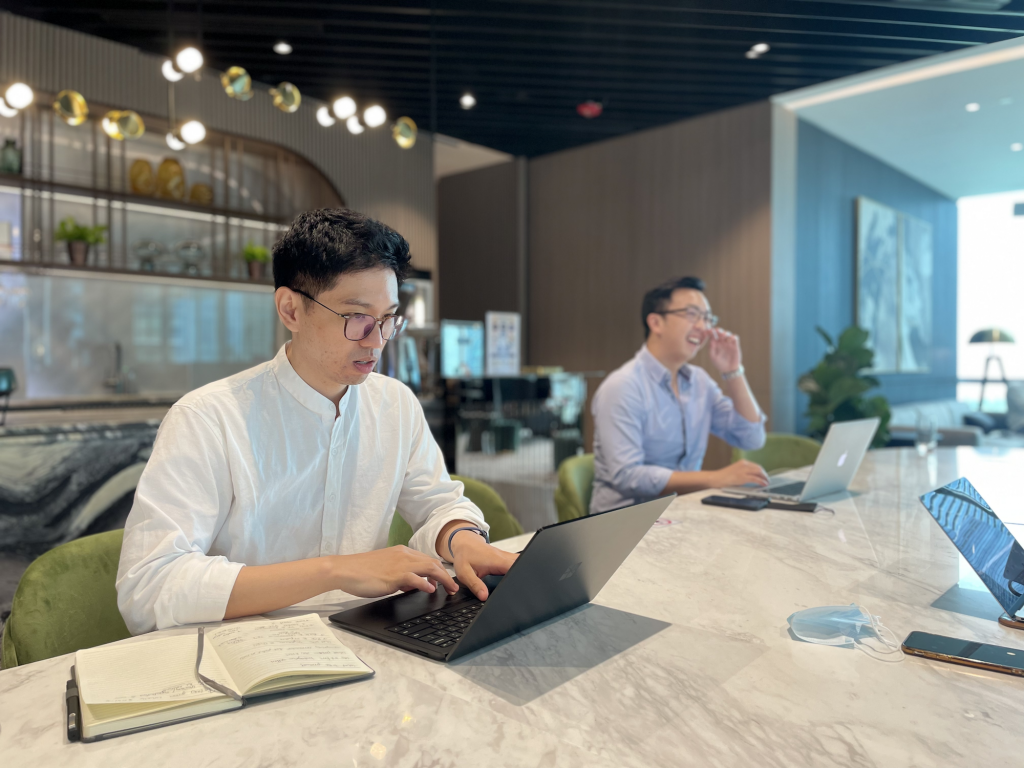The coronavirus pandemic has made one thing certain – Work from a boring office is a thing of the past. It is either going to be from the comfort of your home or from a cafe or a cool coworking space that you love to go to.
The trend of coworking came up a few years back when companies like WeWork and Regus proved to the world that offices need not be boring. With beautifully designed workspaces they were able to attract the best companies and the best crowd.
Deskimo is one such company that provides on-demand work desks at professionally managed workspaces. We recently had a chat with Christian, the co-founder of Deskimo to know more about the company. Here are the excerpts.
What is the startup / product / venture about? Give us a brief description of it.
Deskimo provides on-demand work desks at professionally managed workspaces across Singapore and Hong Kong. We empower the hybrid workforce with access to a quiet, focused space to get work done, to take an important call, or to meet with clients or partners. The majority of companies will choose a hybrid work model post pandemic, however, not all employees have an appropriate home office to get their work done. Deskimo is the way out of this conflict: Deskimo-enabled employees retain their flexibility while having an option for a near-home office.
How many co-founders are there? Please introduce them and their backgrounds.
Deskimo is co-founded by Christian Mischler and Raphael Cohen. Both have gathered a lot of experience in building startups in proptech and hospitality, on-demand businesses and marketplaces.
Christian was a Co-Founder and Global COO at Foodpanda, now part of Delivery Hero ($DHER), before co-founding HotelQuickly together with Raphael, which turned into an OTA processing $100m in annualized GBV (exited in 2017).
Raphael then co-founded GoBee.Bike, which was the second largest bike-sharing company outside of China, before becoming the Head of Asia at Rocket Internet. Christian co-founded GuestReady after HotelQuickly, which is now the leading Airbnb-management company in Europe and the Middle East.
How did you come up with the idea? What motivated you to do this?
The future of work will impact most of us, and it will transform real estate and urban development over the long run. We believe that the future will be a hub & spoke office model with representative, downsized, centrally-located headquarters (= hubs), and satellite offices (= spokes) scattered across the city to a) reduce commute times for employees, and b) reduce cost per desk for companies. Companies will leverage technology to give their employees access to work sites depending on their seniority, department, etc. and to manage their real estate occupancy and employee health & safety.
Who is your target market? Why do you think your product will appeal to them?
We are currently contracting companies that are either downsizing their offices due to the pandemic and a remote-first or hybrid workforce, or that are growing quickly and are looking for a flexible solution so that they don’t have to increase their fixed costs as fast as their headcount. The normal company size is around 20-200 employees at this point, but we also have conversations with companies that employ 1000+ people.
Who are your competitors? How are you different from them?
Our main competitors are cafes, fast food chains, home offices, etc. but everyone agrees that these places are not designed to get focused work done. Operators like WeWork, Spaces, Regus etc. are not competitors but partners, as they are suppliers to us and we bring them additional demand that otherwise they cannot capture. We are asset-light and independent, we have no bias towards certain brands or operators. We aspire to simply aggregate the best possible selection of workspaces in the most convenient locations for our clients and end users.
What are the future plans with the product/startup? Any new features you are planning on?
We are currently contracting existing workspaces that are professionally managed and meet our high quality standards (marketplace). Aside from work desks we will also make meeting rooms available in the application over the coming weeks.
In a second stage we will branch out to build an office & workforce management system for companies to manage their own space and hybrid workforce in addition to the marketplace model.

